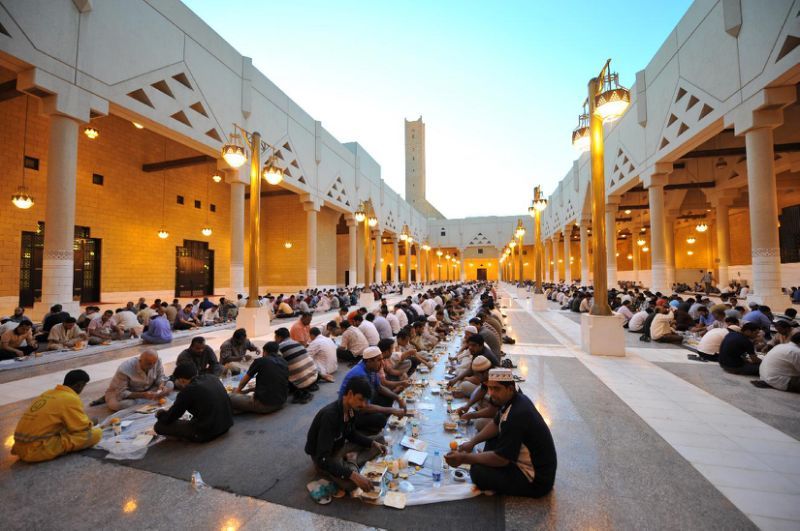The holy month of Ramadan is considered the holiest and most sacred month of the Islamic Hijri (lunar) calendar. Muslims firmly believe that it was during this exalted month that the archangel Gabriel descended from the heavens and revealed the Message to the Prophet Muhammad.
During the month of Ramadan, Muslims are required to elevate their level of spiritual and physical submission to God by way of fasting; that is to say, Muslims must abstain from eating, drinking, smoking and also husband-wife intimacy from the breaking of dawn until the setting of the sun.
Table of Contents
Ramadan dates and calendar 2025
So far, Ramadan 2025 is predicted to begin on 27 February 2025 and end on 29 March 2025, corresponding to Ramadan 1446 in the Islamic calendar.
The exact date of the holy month’s beginning is determined by a moon-sighting committee consisting of religious scholars, astronomers, and other authorities under the cover of night. The committee is responsible for observing certain sightings related to the appearance and cycle of the new crescent moon, which heralds the start of Ramadan.
Ramadan moon sighting 2025 in Saudi Arabia
As of now, there is no available information regarding the moon sighting for Ramadan in 2025. In 2024, the court had issued a request for individuals who sighted the moon, with or without the aid of binoculars, to promptly inform the nearest court to provide their testimony, or to reach out to the nearest center for assistance in contacting the relevant court.
Umrah during Ramadan
If you are thinking of performing Umrah in Ramadan, you can check our article about the latest update of Umrah 2024 below.
Ramadan in Saudi Arabia
The common thread that runs through all predominantly Muslim countries during Ramadan is that life generally slows down as the hours for working and schooling are reduced by two to three hours. Many opt to embrace a nocturnal lifestyle in the sense that they shift their schedule to allow them to sleep through the day and work through the night.
Unlike in places like Dubai, most supermarkets, malls, shops, restaurants, cafes, and nearly all other eateries close down during the daylight hours. Hotels remain open and may still offer food to their non-fasting guests, albeit in screened and partitioned areas.

Image © saudiarabianews.media
Close to sunset, numerous mosques are filled with lines of people sitting in lines facing spreads of food. As the call to prayer is heard signifying the arrival of Iftar (breaking of the fast), numerous people can be heard chanting their prayers before helping themselves to the available sustenance.
It’s also common to observe people, both local residents and visitors, handing out dates and bottles of water to passersby while shouting ‘halal‘ at busy intersections close to Iftar time. The month of Ramadan indeed encourages Muslims to further practice benevolence and charity.
Most businesses resume operations after Iftar and continue to do so until 1 or 2 in the morning. This naturally makes the Ramadan nights alive and wonderful as opposed to its slow and somber days. Friends and family gather at midnight at malls, restaurants, and cafes to shop and indulge in Ramadan snacks, before retiring to their homes and preparing the pre-dawn meal.
Iftar sweets
In the tradition of the Prophet Muhammad SAW, Muslims eat dates to break their fasts; among Saudis, a selection of dates is frequently eaten, along with Arabic coffee, soup, and fried or baked stuffed pastry (samboosa and other dishes).

Kunafah. Image © bayut.com
To top it all off, kunafah (a sugar-soaked pastry loaded with cheese or cream) and logaimat (little round balls of fried dough covered in sweet syrup) are the most popular Arabian deserts on Saudi tables, with qatayef (pancakes filled with cream or nuts) being the icing on the cake.
Some rules to observe
The month of Ramadan is strictly observed in Saudi Arabia. Although non-Muslims are not expected to fast during the month, they are strictly forbidden to eat, drink, and smoke publicly during the day, as it’s punishable by law. The word ‘public’ extends to not just open-air places like streets or parks, but also to offices, factories, and other types of workplaces. Exact rules for Ramadan 2025 will be updated in this section once official information becomes available.
Ramadan praying hours in Saudi Arabia
Muslims living in Riyadh, Jeddah, Makkah, Medina, and other cities start observing Ramadan as per the Sehri time or Iftar time in Saudi Arabia. This is one of the main reasons why the starting date of Ramadan in Saudi Arabia has great significance for them. The prayer timings for Ramadan in 2025 have not yet been released. This section will be updated once official information becomes available.













